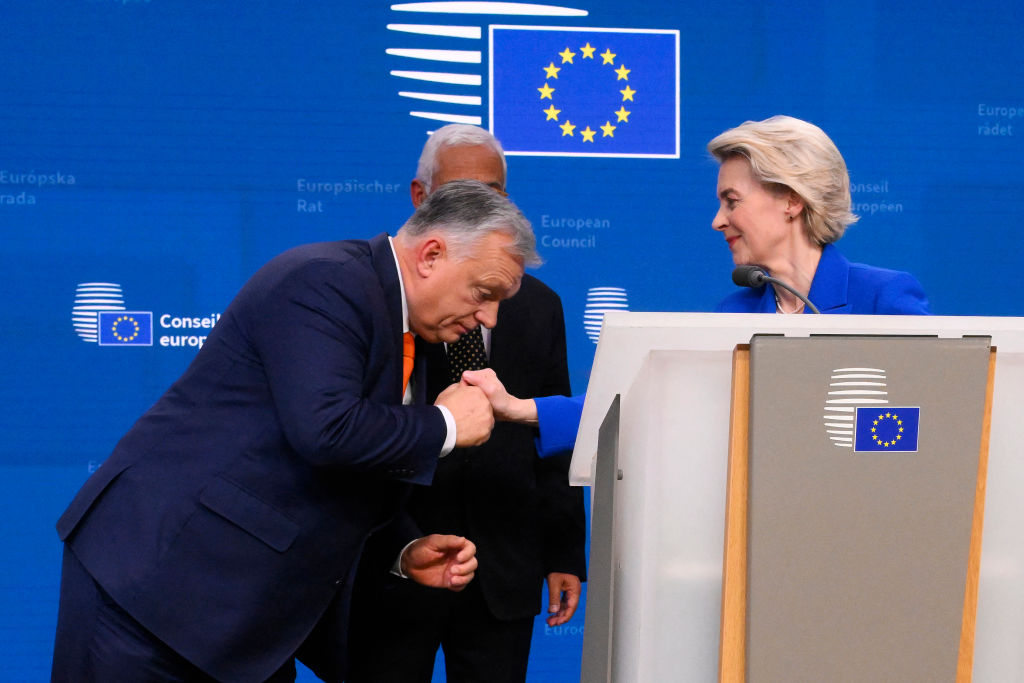Hungary is set to lose more than €1 billion in European Union cohesion funds, the result of an ongoing conflict with Brussels over the country’s alleged violations of the rule of law. The deadline for Hungary to meet the requirements and implement corrective measures passed yesterday, marking a pivotal moment in its relationship with the Union.
This would be the first time a member state permanently and irrevocably loses funding under the Rule of Law Conditionality Regulation, a mechanism introduced in 2020 and purportedly aimed at strengthening countries’ compliance with “EU values”. This is done by allowing the European Commission to withhold funds to governments found in breach of the rule of law — as defined by Brussels, of course.
Following the introduction of the new regulation, the EU proceeded to freeze €6.3 billion in cohesion funds to Hungary, as well as approximately €6 billion in grants from the Covid-19 Next Generation EU (NGEU) recovery fund, citing concerns over irregularities in public procurement, inefficiencies in prosecution, and corruption. Meanwhile, raising similar concerns, the Commission also froze almost €140 billion in EU funds to Poland — then governed by the conservative Law and Justice (PiS) party.
Anna-Kaisa Itkonen, a spokesperson for the European Commission, confirmed that the €1 billion at stake for Hungary represents the initial tranche of suspended cohesion funds. “This loss is irrevocable, and Budapest has no right to appeal,” she said in a statement to the Polish news agency PAP. The funds relate to commitments made in 2022, meaning Hungary will not be reimbursed for projects it carried out under the cohesion policy that year. Failure to address EU recommendations could result in Budapest losing an additional €1.1 billion by the end of 2025, with further penalties possible unless substantial reforms are implemented.
The decision marks a substantial escalation in the EU’s war against Viktor Orbán — and against principles of national sovereignty and democratic self-determination in general. It’s important to understand that the conditionality mechanism is more than just a way for the EU to impose its “values” on member states by resorting to financial blackmail, which would be concerning enough, especially where such “values” are misaligned with nationally approved policies on issues such as immigration.
The reality is that the rule of law is, more than anything, a convenient pretext for targeting dissenting governments that resist aligning with the EU’s expanding supranational authority and broader political agenda — including on matters largely unrelated to the rule of law, such as economic and foreign policy. This is why the EU is happy to ignore rule-of-law violations when pro-Brussels governments are involved, so long as they comply with Union policy on the issues that really matter, such as Ukraine.
Poland is a textbook example: within a year of the Left-liberal, pro-EU coalition led by Donald Tusk taking power, the country has experienced an unparalleled attack on the rule of law. The new government has launched an authoritarian power grab against the media, the judiciary and its political opponents. Yet all this has been met with silence in Brussels — and even cheered on. Indeed, the European Commission’s reaction has been to unblock up to €137 billion in frozen funds, highlighting the hypocrisy of the whole rule-of-law debate.
As far as Hungary’s finances are concerned, the €1 billion at stake doesn’t pose a huge problem, amounting to around 0.5% of GDP. However, this latest move signals the EU’s increasingly aggressive approach towards governments which refuse to toe the line. Its willingness to trample over basic democratic principles was on full display in Romania recently, where the EU supported the constitutional court’s decision to annul the results of the presidential election, in which independent populist candidate Călin Georgescu came top, on grounds of alleged — but unproven — “foreign interference”.
This presents Hungary with a dilemma. So far, it has managed to maintain a high degree of policy autonomy even in the context of the EU straitjacket. But as Brussels continues to tighten the screws on recalcitrant governments, leaders like Orbán may find themselves with no real option but to choose between national autonomy and EU membership.











Join the discussion
Join like minded readers that support our journalism by becoming a paid subscriber
To join the discussion in the comments, become a paid subscriber.
Join like minded readers that support our journalism, read unlimited articles and enjoy other subscriber-only benefits.
Subscribe